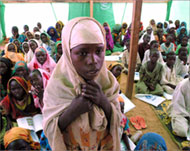Talks in Nigeria to end Darfur conflict
Sudanese government and rebel delegates have gathered in Nigeria for talks to find a political solution to the festering Darfur conflict.

The talks, hosted by the African Union (AU) on Monday, follow intensifying efforts by Khartoum to prove it is cracking down on pro-government militia known as Janjawid, who are accused of looting and burning villages, to put down an 18-month-old rebel uprising.
Sudan is represented by Agriculture Minister Mazjub al-Khalifa Ahmad, an influential government figure, while the two Darfur rebel groups sent their top negotiators.
“The meeting here is essentially to deal with a political solution to Darfur,” said Nigerian President Olusegun Obasanjo, who is also AU chairman, before the talks in Abuja.
Peacekeepers unnecessary
Sudan‘s al-Khalifa Ahmad said there was no need for the AU to send a peacekeeping force to the troubled region, saying Khartoum could handle the security situation.
 |
|
UN terms the conflict as the |
Asked if Sudan would accept the proposed 2000-strong AU force, he said: “I don’t think that is necessary.”
Sudan is attending the peace talks to begin a dialogue, but “simultaneously we are going to disarm the rebel movement, the Janjawid and other militias,” he said.
The Nigeria talks, also attended by Arab League Secretary General Amr Musa, is taking place two days after Khartoum signed an agreement with the United Nations to ensure the voluntary return of refugees and to give Darfur people more say in local government.
Deadline approaching
The meeting also comes a week before a UN Security Council deadline for Khartoum to show it is taking steps to protect civilians and disarm the Janjawid or face possible sanctions.
|
“The meeting here is essentially to deal with a political solution to Darfur“ Olusegun Obasanjo, |
The Darfur revolt broke out in February 2003 after years of conflict between nomads and farmers over scarce resources in the arid western region.
The UN says the fighting has triggered the world’s worst humanitarian crisis with about 200,000 refugees in neighbouring Chad and more than a million displaced in Sudan.
A previous Darfur peace initiative broke down in July after the rebels demanded as a precondition for talks that the government should disarm the Janjawid.
Rwanda has already sent 155 soldiers to protect AU representatives monitoring a ceasefire between the rebels and the government, and Nigeria is due to send another 150 this week.
But Nigeria is already thinking of sending up to 1500 troops and other African nations have offered to join them.